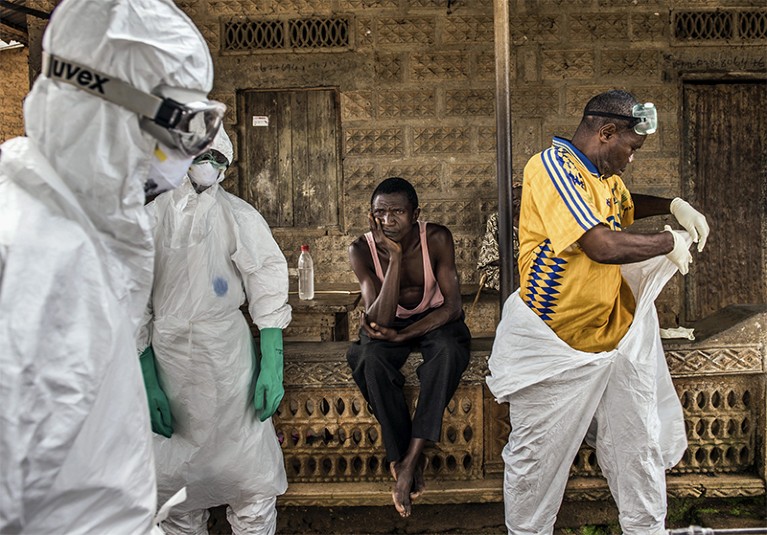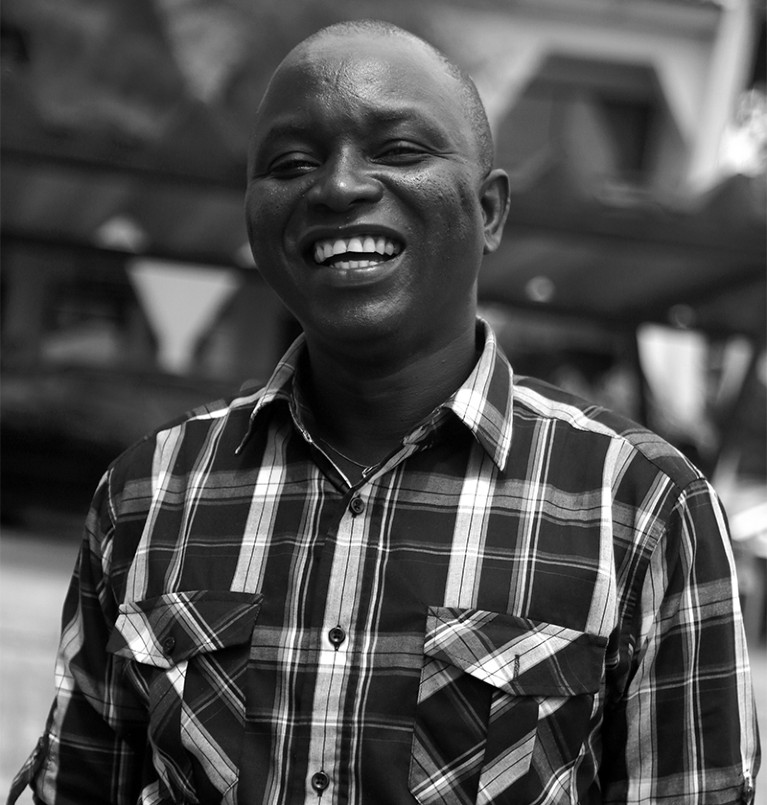
Workers prepare to bury the body of someone who died of Ebola in Sierra Leone in 2014.Credit: Tommy Trenchard/Panos
Outbreak Culture: The Ebola Crisis and the Next Epidemic Pardis Sabeti and Lara Salahi Harvard University Press (2018)
When you work inside a system that you believe in, yet recognize as dysfunctional, it can be hard to offer a balanced critique. And the stakes are high when the system in question is the response to a humanitarian emergency, where public opinion determines crucial funding. Outbreak Culture, on the Ebola crisis of 2013–16, strikes this delicate balance expertly.
The central theme of the book, by geneticist Pardis Sabeti and journalist Lara Salahi, is that common threads of dysfunction run through responses to epidemics. These emerge from the underlying architecture of societies (resulting from history, politics and culture), the competition between international organizations and (sometimes) the self-serving motivations of individuals in high-stress situations. We fracture along lines of existing weaknesses.
Sabeti — who was part of the Ebola response effort — and Salahi show that the world is doomed to repeat the same mistakes with every new epidemic unless outbreak response shifts to a “mode that favors collaboration instead of competition, and readiness instead of reaction”. My experience leads me to concur. I was a clinical responder in Sierra Leone during the Ebola epidemic in both 2014 and 2015; I now work in Uganda, across the border from the current outbreak in the Democratic Republic of the Congo. (Full disclosure: I appear briefly in the book.)
Outbreak Culture is based on the cumulative accounts of more than 200 people who worked on the West African response, from clinicians and researchers to public-health workers and administrators. By bringing in these voices, the work distinguishes itself from recent individual accounts. Yet it maintains a personal tone. It also incorporates the post-epidemic analyses by international organizations and governments, such as the internal and external World Health Organization reviews, and independent reports by the US National Academy of Medicine and other academic collaboratives. And it puts a human face on the challenges by telling the stories of researchers, clinicians and patients, including Sabeti and members of her lab.
Today, every new outbreak demands the re-creation of administrative structures. Negotiations for access and operations are made in real time. Sabeti and Salahi argue that the dearth of dependable administrative structures and oversight in West Africa created a space in which competing incentives and personal ambitions wreaked havoc. They highlight the dark underbelly of on‑the-ground interactions that slow down and ultimately stymie the response itself, and which many reports have previously shied away from.
The authors interviewed numerous people and sent out an e-mail survey; 132 people answered. This was anonymous, because otherwise most of us (I took the survey) would have baulked at answering the hard questions it featured about competition, corruption and waste. About 27% of respondents said that they had experienced illegal tactics during the epidemic. Another 37% noted that they had experienced intimidation, for instance by personally facing, witnessing, hearing about or perpetuating it.
Sabeti and Salahi share stories of how data and samples that could have helped were hoarded by researchers and organizations, including individuals within several international public-health bodies. They give an unflinching account of how corruption at all levels siphoned resources away from communities in need. For example, the International Federation of Red Cross and Red Crescent Societies confirmed that almost US$6 million of its Ebola funds were misappropriated in West Africa. The authors also highlight concrete examples of how organizational politics, cultural differences and mistrust led to ineffective communication at crucial points during the epidemic.
Despite these revelations, the book ends on a positive note. It links failures during the epidemic to specific underlying gaps in governance (for example, the ways in which aid is distributed and reported allowed for individuals to siphon off funds). It identifies core processes required for reform. These include streamlining communication systems between outbreak-response partners, and establishing a central research-governance structure composed of experts without conflicts of interest.

Sheik Humarr Khan, a leading researcher in haemorrhagic fevers from Sierra Leone, died of Ebola in 2014.Credit: Pardis Sabeti/Sabeti Lab.
It would have been interesting to know what, if any, changes the organizations named have made in the aftermath of the epidemic. And the authors could have invited the individuals singled out for bad behaviour to give their perspective, even if confidentially.
Indeed, my favourite part of the book was the authors’ description of Sierra Leone’s Fambul Tok (Krio for ‘family talk’), a version of truth and reconciliation committees that operate at the village level. They propose these as a best-practice example of how international organizations can elicit real-time feedback from outbreak responders.
The power of Outbreak Culture is its universality. It describes dynamics common at varying levels in every humanitarian emergency. But if this book is in any way about one person, it is about Sheik Humarr Khan. His story is woven through the authors’ arguments. Khan was born and grew up in Sierra Leone, and against immense odds he became a leading researcher in haemorrhagic fevers there. He was one of the first physicians to care for people with Ebola in the country in the first half of the epidemic. In July 2014, he died of the disease. The book begins with the political and ethical issues surrounding his treatment. Where should he have been treated? Should he have been given experimental therapeutics? What about the failure to evacuate him (or delay in doing so) for more advanced supportive care, even as international responders from the West were offered this opportunity?
My first deployment as physician in an Ebola treatment unit during the epidemic was in Kenema, Sierra Leone. I arrived about three weeks after Khan died; the health-care community there was still reeling from the loss. His story underscores one of the basic truths of the book: where you are born decides whether or not you survive Ebola. From the comfort of a Western lab or clinic, it is easy to forget the differences in quality of treatment (and a million other small injustices) for people in poorer communities. It is much harder to ignore those differences when you are working in the field, shoulder to shoulder with health-care providers who know that they will not be airlifted to better care if they get sick, yet have the unimaginable courage to carry on. Outbreak Culture is a much-needed call for greater justice next time.

 Beating Ebola
Beating Ebola
 Chasing epidemics
Chasing epidemics
 Heroes of global health
Heroes of global health








